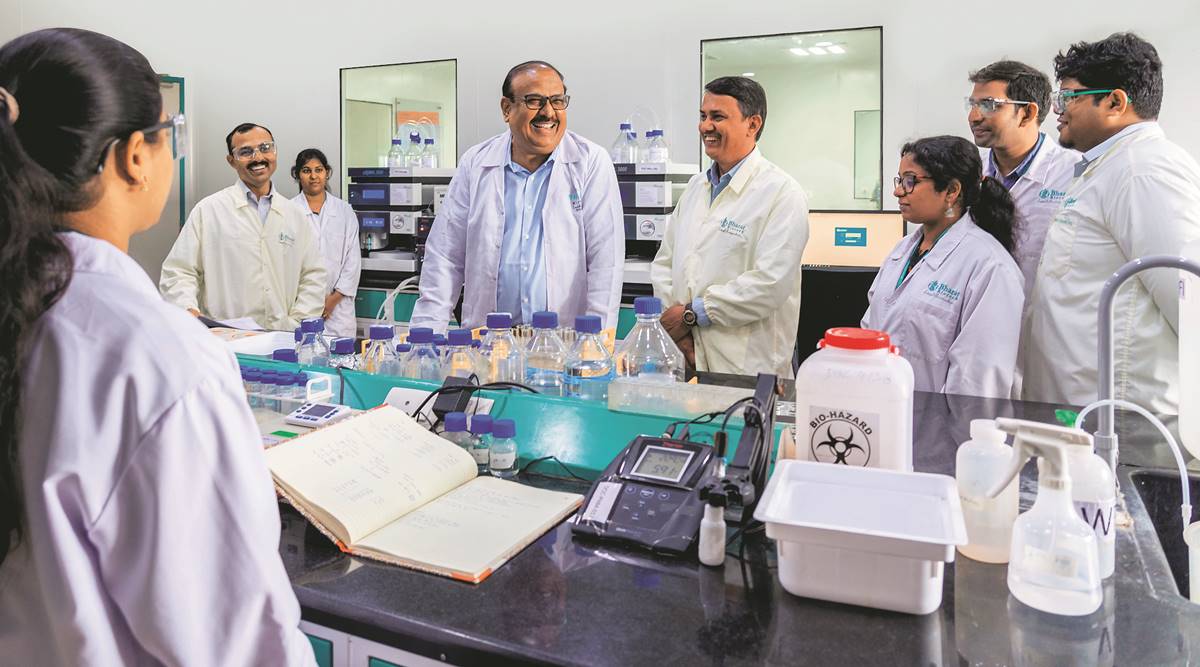Best 10 Biotech Companies in India 2022

A nation’s economy depends on the production of biotechnology companies. Biotechnology is primarily used for the production of these products by this company. India’s ten best biotech companies are among the best biotech and pharmaceutical companies. Companies that produce, design, or deliver biotechnology products, or services are biotech companies.
Companies in biotechnology usually work in medical fields, agriculture, crop production, and other non-food uses for crops. For example, bioleaching is carried out by naturally occurring bacteria in the mining industry. A colour represents each biotech field. Companies use red biotechnology to develop antibiotics and genetic cures for medical conditions.
Green biotechnology is applied to agricultural processes, whereas white biotechnology is used in industrial processes. Blue biotechnology is used in marine operations.
Top 10 Best Biotech Companies In India 2022
- Serum Institute of India
Corporate Office – Pune India
Chairman – Cyrus S. Poonawalla
Establishment – 1966
Business – Biotechnology
Sector – Private
One of India’s most renowned biotechnology companies is the Serum Institute of India Limited. This company has produced several best medicines for quite a several diseases. In addition to purified Vero cell rabies vaccines, DTaP vaccine, and others, the company has come up with many other vaccines.
- Panacea Biotech Ltd.
Corporate Office – New Delhi, India
Chairman – Soshil Kumar
Establishment – 1976
Business – Pharmaceutical, Biotechnology
Sector – Private
Having ridden on the shoulders of able officials and professional staff has led Panacea Biotech to the path of success. By being honoured with the BioSpectrum Product of the Year award for 2011, PacliALL has successfully advanced its product.
- Biocon Ltd.
Corporate Office – Bangalore, India
Chairman – Kiran Mazumdar-Shaw
Establishment – 1978
Business – Biotechnology
Sector – Private
It seems as though Biocon has all the necessary resources for research and development in many different fields and also comes up with the best medicines in those fields as the company has such a large number of dedicated researchers, workers and other employees who are continuously looking forward to discovering new treatments. Every person in the country respects and trusts the company.
- Novo Nordisk
Corporate Office – Denmark
Chairman – Sten Scheibye
Establishment – 1923
Business – Pharmaceutical
Sector – Private
In addition to stealing the business of other top companies, the Denmark-based Novo Nordisk India has more to offer than just taking their clients. As one of the leading pharmaceutical companies providing quality medications in any possible field, this company has held a top position.
- SIRO Clinpharm
Corporate Office – Thane, India
Chairman – Dr Gautam Daftary
Establishment – 1996
Business – Biotechnology / Drug Development
Sector – Private
Adding the company to the country’s top manufacturers is one of the company’s goals. The only reason to pick this company among the best ten biotech companies in India is that the company is looking forward to making discoveries.

- Novozymes South Asia
Corporate Office – Bagsvaerd Denmark
Chairman – Københavns Lufthavne
Establishment – 1925
Business – Biotechnology
Sector – Private
When it comes to this industry, Novozymes has excelled. Together with the company’s best officials and a team of talented and experienced individuals, this company provides the best example of obtaining the basics for all medicines most straightforwardly and straightforwardly. According to the company, it is satisfied with the clients’ satisfaction when they are happy. According to Forbes, this company is also ranked among the top 10 biotech companies in India.
- Shantha Biotech
Corporate Office – Hyderabad, India
Chairman – K I Varaprasad Reddy
Establishment – 1993
Business – Biotechnology
Sector – Private
Shanta is one of the most reputed brands in this field because it is one of the pioneering companies in biotechnology. With quite a large clientele and a customer service environment that satisfies clients, the company has quite a few customers. The company excels in several areas compared to many others in the trade.
- Indian Immunologicals
Corporate Office – Hyderabad, India
Chairman – Dr Amrita Patel
Establishment – 1982
Business – Biotechnology
Sector – Private
NDDB (National Dairy Development Board) has set up Indian Immunological Limited, one of the most prominent companies in this field across the nation. This company provides the best service to the customers, a service that will be highly praised when one knows about the basics of the company and their work.
- GlaxoSmithKline Pharmaceuticals Ltd.
Corporate Office – London, United Kingdom
Chairman – Chris Gent
Establishment – 2000
Business – Pharmaceutical, Biotechnology
Sector – Private
The company was founded well in 1942 and has always contributed to the country. Being one of the best-organized biotech firms in history has been achieved quietly. The company excels in several other areas as well. When you think of the company’s success, you always think about the company, the one you would look up to.
- Wockhardt Ltd.
Corporate Office – Mumbai, India
Chairman – Habil Khorakiwala
Establishment – 1960
Business – Pharmaceutical and Biotechnology
Sector – Private
India’s company is likely to be one of the top ten in biotechnology. Sales in the US and Eur account for Seventy-six per cent of the company’s sales revenue, but it has now set its sights on the Indian market, where it has launched well. The company will inevitably be a severe competitor to other biotechnology companies in India since it appears to have quite a promising future.
The biotech industry in India is growing.
The Indian biotechnology industry is among the top 12 globally, with about 3% of global biotechnology revenues. By 2024, India aims to achieve a $5 trillion economy, partly due to the biotechnology industry.

The biotechnology sector plays a vital role in the global vaccine market. Providing DPT, BCG, and measles vaccines globally and supplying 70% of WHO’s vaccines (essential Immunization Schedule), the biotechnology sector plays a vital role in the global vaccine market. Global Innovation Index also ranks India 48th.
Over 5,000 companies are involved in the biotech industry in India (760 core companies and 4,240 startups) and organize themselves into five segments: biopharmaceuticals, bio-agriculture, bio-industrial, and services, which includes biotech, contract research organizations, and research and development.
- Approximately $150 billion is expected to be generated by the Indian biotechnology industry by 2025, with a CAGR of 16.4%
- Growth of 12.3% from FY20 to FY19 (FY20 to FY19)
- In 2025, there are expected to be over 10,000 biotech startups.
- Biotech companies with 760+ products and 200+ core companies
- Contribution to national GDP (2.7% in 2020 compared to 2.2% in 2019)
- The first biosimilar to be approved and marketed in India was in 2000. The country is now home to 98 approved biosimilars (as of September 2019), a record number.
For greenfield pharmaceutical companies, FDI is allowed at 100%.
FDI in brownfield pharma is 100% permitted under the government route in up to 74% of cases. Beyond 74%, it must be approved by the government.
For the manufacturing of medical devices, foreign direct investment is allowed up to 100% under the automatic route.
How Should I Start Biotech? Here are seven steps you need to take
It is common for would-be entrepreneurs to imagine starting a business one day, but most do not know how to get started. The process cannot be random. To launch a successful company, a lot of events must coincide.
 It is sometimes called “serendipity” or “chance” to describe when timing and opportunity come together successfully.
It is sometimes called “serendipity” or “chance” to describe when timing and opportunity come together successfully.
It is for the prepared mind that chance favours, as Louis Pasteur explained: “Chance only favors the prepared”. There is a favour for doing things that knowing what to do first is the most challenging part. The following are seven essential steps for starting a biotech company.
Step 1. Determine whether there is a genuine market need for your idea
Though good ideas are precisely good, not every good idea becomes a product. Consider that many exciting technologies still have not found a market niche. Deceptions of Marketing High Tech Products” on BioBlog deals with the significance of determining the potential market need for your future product.
It is also essential to ensure that intellectual property (IP) covers the technology of interest. Ensure you have the agreed-upon rights, intellectual property and commitments from the inventors and the key personnel (if you are not one yourself). You possess the knowledge necessary to make this technology successful.
Step 2. Determine key personnel and company founders
Companies cannot succeed without good employees. Identification of these individuals and their interest and commitment to the future organization must be handled carefully. All interested parties should not found a company at this stage; neither should all founders receive identical stock unless all intend to work in the company full time once funded.
Proportional ownership can be challenging to determine. A founder shouldn’t receive equal equity ownership, as he won’t work with the new venture, yet he will receive a steady paycheck and ride on the coattails of his colleagues.
Step 3. Select a competent lawyer
A key partner in this individual. In addition to legal advice and guides, you should also seek the guidance and counsel of your attorney. In establishing and growing your company, they will assist you with all corporate and business issues.
It will take you less than a week to memorize this person’s phone number after you launch your company. In this regard, the ideal advisor is someone you trust, with whom you have a good working relationship, and most importantly, who has extensive experience advising startup biotechnology companies.
Step 4. When you have investor interest, convert to a C Corporation
The next step would be to fundraise and secure federal SBIR grants (Small Business Innovative Research). Both of these cannot be accomplished without an incorporated company. The main advantage of incorporating early is that you can issue founders stock without having to pay obscene amounts for shares (or incur immense tax ramifications), knowing that the company is highly undervalued at this point.
When a company is founded, and in the early stages, it will begin as an LLC and then convert into a Delaware C Corporation with more favourable corporate laws. When a biotech company becomes traction and investor interest grows, it is better to form a C Corporation instead of an LLC. If potential investors do not want to change their corporate structures, they may wait to invest in biotech and life science companies.
Step 5. Prepare a business strategy and a marketing plan
If you are planning to raise money, you must use a well-written business plan which clearly explains the market problem, the need for your product, how much revenue it will generate, what you intend to do with the cash, what return and exit you plan to offer the investor, and who the company’s key personnel are.
You should consult your attorney when writing your business plan. A private placement memorandum, or fundraising document, will be created. Following that, you should look for investment groups interested in your stage and sector of business.
Step 6. Work as a virtual company
Don’t give up your day job! Make sure you minimize your risk when starting your company. Since most people have access to computers, cell phones, and the internet, brick and mortar are not necessary at this early stage. Don’t spend any money on rent at this point, but ensure you have access to a conference room or meeting room. Work on the new business while working for your current company.
Be careful when performing work for the new business while working at your current company. In the early stages of your business, you may have to deal with legal issues using company facilities and time. Consult with an attorney about these matters.
Step 7. Develop the technology incrementally through successive product milestones after raising seed capital
Highlight the critical milestones of your entire product development process to enhance the product’s value. Meet these projections for the first few milestones and then demonstrate consistent progress. Investing enthusiasts enjoy hearing about companies making steady progress on their planned development path.
Your company’s value will increase if you meet key milestones on time. This will also lower the investment risk—the likelihood of securing future funding increases when milestones are met consistently.
AREAS OF BIOTECHNOLOGY DEVELOPMENT

In five broad categories, the committee evaluated biotechnology’s potential applications: sensors, electronics and computing; materials; logistics; and therapeutics. Each of the following areas was then identified as offering significant Army opportunity:
-
Sensor: Analyzes assays; methods of detecting faults in chips; chip architectures
-
The subject of protein-based devices, bio-computers, and biomolecular hybrid devices is electronic and computing
-
Technologies: tissue engineering, bioinspired materials, hybrid materials; biologically-inspired materials
-
Logistics: nanotechnology-based devices; functional foods; renewable energy sources; miniaturized biologic devices
-
Drugs, vaccines, and delivery systems for therapeutics: genomics and proteomics.
IN INDIA: PROMISES AND FAILURES
- The country’s biopharmaceutical industry has led the charge to grow India’s biotech sector. There is tremendous growth potential, especially in biopharmaceuticals, bio-services, and bio-agriculture, due to increased private investment in R&D and a relatively low starting point.
- Despite these shortcomings, India’s regulatory system is hampered by bureaucratic redundancies and delays that delay or thwart the approval of new products. In addition, biotechnology has been highly politicized, resulting in a lack of a solid scientific or empirical basis that further impedes growth.
- Efforts must be made to strengthen and streamline New Delhi’s biotech regulation system and facilitate the commercialization of biotech advances to build a greater public understanding of biotechnology, appropriate norms, and baseline practices.
GOVERNANCE IN GLOBAL CONTEXT
- International legal arrangements that govern biotechnology today are patchwork, and there are gaps in the fields of intellectual property protection, nonproliferation of biological weapons, and fair terms for cross-border movement of products involving biotechnology. The absence of global norms affecting new biotech advances is even more evident, particularly in big data analytics and genetic engineering.
- It is essential for developing and developed countries to develop guidelines for responsible innovation in biotechnology. In discussions related to defining and setting these emerging global standards, India should help position itself as a strong advocate. The international community should think again about existing global regimes regarding biodiversity and patenting. For example, India and the rest of the world should rethink and possibly overhaul the bio-patenting regime.
GROWTH OBSTACLES IN BIOTECH
The government of India’s relatively young efforts to fund and promote biotech research deserve more attention. Still, without a streamlined, well-resourced regulatory system and a supportive political climate, these positive steps will not yield optimal results. Regulatory bodies must coordinate effectively among themselves and be aware of innovations occurring in the biotech sector early on to accommodate innovations while safety concerns are met.
Biotechnology does offer a great deal of promise. Still, it also raises profound ethical and political dilemmas that are necessary to consider, such as those relating to the alteration of genetic material. Potentially harmful genetic mutation is the essential concern. There are new ethical and legal questions arising from the potential medical applications of CRISPR29. While intended to treat debilitating hereditary diseases, the technology can interfere with cellular signalling pathways and alter genes on the human germline.
This would permanently alter the human gene pool with potentially dangerous consequences, as later changes would be passed down to subsequent generations.
It is also disputed whether intentional gene drives, that is, efforts to improve specific traits genetically can lead to a loss of human genetic diversity since this might, in turn, contaminate future generations.
Additionally, while big data applications in genomics and bioinformatics hold great promise, such developments also raise some fundamental questions concerning data privacy, especially about keeping genetic information secure and regulating commercial uses of such private information.
edited and proofread by: nikita sharma




